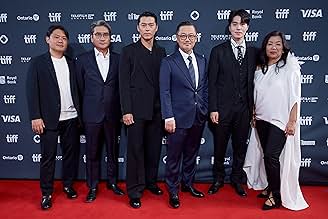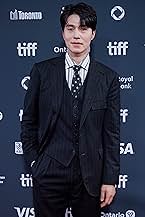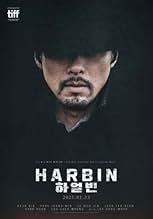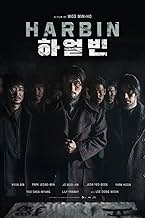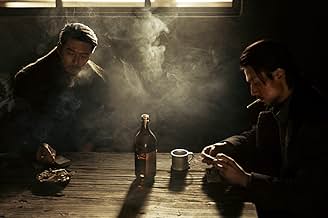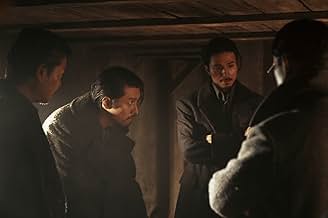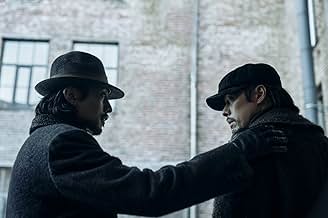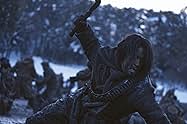Segue gli attivisti indipendentisti coreani che hanno lanciato un audace attacco ad Harbin contro i giapponesi per ottenere l'indipendenza del loro Paese.Segue gli attivisti indipendentisti coreani che hanno lanciato un audace attacco ad Harbin contro i giapponesi per ottenere l'indipendenza del loro Paese.Segue gli attivisti indipendentisti coreani che hanno lanciato un audace attacco ad Harbin contro i giapponesi per ottenere l'indipendenza del loro Paese.
- Regia
- Sceneggiatura
- Star
- Premi
- 1 vittoria in totale
Jeon Yeo-been
- Gong Bu-in
- (as Jeon Yeo-bin)
Recensioni in evidenza
Japan's strained relationship with Korea goes back to the 16th Century. The occupation of Korea by Japan in the 20th Century was among the worst examples of colonial brutality of modern times. It is the events surrounding the 1910 Annexation of Korea by Japan, and the Korean resistance, that is the subject of this powerful movie.
This is a movie based upon historical events. Therefore, the strength of the movie is not in the surprise reveal of the plot's climax. That could easily be explored with the stroke of a computer key. The strength of the film is in the gripping execution of the storytelling. The filmmakers have done a masterful job injecting the viewer into the story. While many of the details of the interactions of the characters may be fictionalized, this in no way diminishes the appreciation for the real life struggle of the Korean people to overthrow their oppressors.
The Japanese Occupation lasted until the end of World War II. Soon after Korea was plunged into its own conflict, leading to the division between North and South, which exists until this day. The fact that Korea has catapulted to becoming a first world nation is a testament to the resilience of the Korean spirit in overcoming such great and sustained national adversity.
Woo Min-ho's Direction is Oscar worthy. He manages to move the story along with a swift pace, with great attention to detail, and not get bogged down in too much detail as to turn the film into a documentary. This is crisp, dramatic storytelling.
The acting by the entire cast is superior. There is no particular standout in this ensemble cast. Whether part of the Korean resistance, the Japanese military, or Japanese hierarchy, the performances are engaging and thoughtful. They are played with great depth. There are no stereotypical archetypes here.
While the film is not rated, it is intense and, somewhat, brutal at times. None of the brutality is gratuitous, however. The violence and brutality here supports this dramatic story.
While the film is a historical drama it is also a top notch spy thriller, which will keep the viewer engaged and intrigued throughout. The historical and thriller elements are beautifully woven together to enhance the viewing experience.
Harbin is a powerful movie and I highly recommend it.
Watch it in Korean, with English subtitles.
This is a movie based upon historical events. Therefore, the strength of the movie is not in the surprise reveal of the plot's climax. That could easily be explored with the stroke of a computer key. The strength of the film is in the gripping execution of the storytelling. The filmmakers have done a masterful job injecting the viewer into the story. While many of the details of the interactions of the characters may be fictionalized, this in no way diminishes the appreciation for the real life struggle of the Korean people to overthrow their oppressors.
The Japanese Occupation lasted until the end of World War II. Soon after Korea was plunged into its own conflict, leading to the division between North and South, which exists until this day. The fact that Korea has catapulted to becoming a first world nation is a testament to the resilience of the Korean spirit in overcoming such great and sustained national adversity.
Woo Min-ho's Direction is Oscar worthy. He manages to move the story along with a swift pace, with great attention to detail, and not get bogged down in too much detail as to turn the film into a documentary. This is crisp, dramatic storytelling.
The acting by the entire cast is superior. There is no particular standout in this ensemble cast. Whether part of the Korean resistance, the Japanese military, or Japanese hierarchy, the performances are engaging and thoughtful. They are played with great depth. There are no stereotypical archetypes here.
While the film is not rated, it is intense and, somewhat, brutal at times. None of the brutality is gratuitous, however. The violence and brutality here supports this dramatic story.
While the film is a historical drama it is also a top notch spy thriller, which will keep the viewer engaged and intrigued throughout. The historical and thriller elements are beautifully woven together to enhance the viewing experience.
Harbin is a powerful movie and I highly recommend it.
Watch it in Korean, with English subtitles.
Unforgetable Masterwork! Serena But Profound.Hyun Bin is deserving of a significant acting accolade.
A masterwork beyond belief! Every moment was brilliantly performed by the actors, the cinematography was breathtaking, and the chills I got were unreal. There is no CG in the backgrounds or landscapes. Keeping that in mind will likely help you appreciate it more. I believe that you will be able to appreciate the film more if you watch it while following the emotional journeys of the characters, particularly Ahn Jung-geun. The movie seems serene but powerful to me. After seeing it, you will carry with you the lesson that General Ahn Jung-geun wished to get across: we should stay brave and optimistic and take things one step at a time. Unvel.
Harbin Movie Review
Harbin is a disappointing cinematic experience that fails to live up to its potential. Despite the visually stunning direction and well-crafted atmosphere, the film struggles to maintain interest due to its sluggish pacing and lack of emotional depth.
The most frustrating aspect is Hyun Bin's performance, which stands out as the film's weakest element. His portrayal lacks the intensity and charisma required for such a role, making it difficult to stay invested in the story.
While some supporting actors, particularly Jo Jung-min, manage to deliver strong performances, they aren't enough to salvage the film. Harbin had all the ingredients for success but ultimately falls flat, leaving viewers with a sense of disappointment.
Harbin is a disappointing cinematic experience that fails to live up to its potential. Despite the visually stunning direction and well-crafted atmosphere, the film struggles to maintain interest due to its sluggish pacing and lack of emotional depth.
The most frustrating aspect is Hyun Bin's performance, which stands out as the film's weakest element. His portrayal lacks the intensity and charisma required for such a role, making it difficult to stay invested in the story.
While some supporting actors, particularly Jo Jung-min, manage to deliver strong performances, they aren't enough to salvage the film. Harbin had all the ingredients for success but ultimately falls flat, leaving viewers with a sense of disappointment.
It's almost like watching a film noir in the 50s. Limited sources of light and shadow create a mysterious and suspenseful vibe. Low-key lighting and toned-down colors and even a little bit of melancholy. 'Harbin' narrates the story in a slightly detached and aloof manner.
Film noir is the right 'form' to maximize 'the content'. The director wants to describe a human Ahn rather than a hero Ahn. His anguish, doubts, and mistakes are all included, and it's not a story of a hero who saves the world. He's a human who carries out the responsibilities given to him at a difficult time in history. Ironically, after seeing him as an ordinary human being, the audience respects him more because one begins to feel closer and more attached to Ahn.
For example, for the battle scene in the beginning, Ahn's army does not fight with refined techniques or delicate choreography. It's a street fight and gang fight, throwing punches in the air and covered with mud. That feels more real and more down-to-earth the same as how the director wanted to portray Ahn.
The only weakness is that the storyline is too lineal and simple. It's not like there are no dramas in the movies, but it does not feel dramatic not even once.
Film noir is the right 'form' to maximize 'the content'. The director wants to describe a human Ahn rather than a hero Ahn. His anguish, doubts, and mistakes are all included, and it's not a story of a hero who saves the world. He's a human who carries out the responsibilities given to him at a difficult time in history. Ironically, after seeing him as an ordinary human being, the audience respects him more because one begins to feel closer and more attached to Ahn.
For example, for the battle scene in the beginning, Ahn's army does not fight with refined techniques or delicate choreography. It's a street fight and gang fight, throwing punches in the air and covered with mud. That feels more real and more down-to-earth the same as how the director wanted to portray Ahn.
The only weakness is that the storyline is too lineal and simple. It's not like there are no dramas in the movies, but it does not feel dramatic not even once.
Harbin was a movie that took me on a journey in one particular sense: it starts off with a spectacular and especially gnarly, grisly insurgent-battle set piece, so pungent with blood and viscera and gore on a level that means to shock you with its brutality; this is followed by our flawed but stalwart hero Ahn Jung-Geun (don't worry you will be reminded of his name by the scarred Japanese antagonist as dozen times letting go the Japanese lieutenant for the whole "we can't keep going down this dark path" reasoning that ultimately leads to part of his troops being massacred; this then leads to... a reprimand but then he is back in good graces for some reason as the main plot to take out a Japanese Prime Minister; then it is a little dull as it goes into major exposition-plot mode and there are long shots of landscapes and characters that are fairly thin (and I had that worry of "oh this is getting too dry and dull)...
Then a funny thing happens: the story takes a suspenseful turn around the halfway mark (actual storytelling is a way where it's being *shown* instead of told as our hero turns his head on a train and book revelation): a major character is a mole in the Korean operation, and the unfolding of how this came to be - in what should be a stock approach with a black and white tinted flashback but it manages to be directed so that we are locked in with the performances and tension that this brings - is what brought me back around to liking the film again. It's never a poorly made film, on the contrary the director Woo Min-Ho has a sharp eye for detail and artistry, from the opening shot of the lone man on the ice to those ragged and harrowing battle shots, and then how we always know what is happening during the attacks or that one big whoops of an explosion that mucks up the plot for the Koreans.
If there's any overriding issue though it's that the main character of Ahn is just not that compelling, through no fault of Hyun Bin, simply that it's most interesting to see his best intentions turned sour from his comrades, but then this doesn't figure much into the rest of the story and he becomes more of a story device than anything else. Luckily the supporting cast pick up the slack, especially Park Hoo, Jo Woo Jin and, nearly unrecognizable from his various Kdrama appearances I'm used to seeing, Lee Dong-Wook (our boy has facial hair for once), and one does get more involved with the plot the more the stakes get turned up in the second half. It's worth seeing, though perhaps if you want a dark and gloomy wartime espionage epic where the ambition really meets the artistry go watch or watch again Age of Shadows instead.
Then a funny thing happens: the story takes a suspenseful turn around the halfway mark (actual storytelling is a way where it's being *shown* instead of told as our hero turns his head on a train and book revelation): a major character is a mole in the Korean operation, and the unfolding of how this came to be - in what should be a stock approach with a black and white tinted flashback but it manages to be directed so that we are locked in with the performances and tension that this brings - is what brought me back around to liking the film again. It's never a poorly made film, on the contrary the director Woo Min-Ho has a sharp eye for detail and artistry, from the opening shot of the lone man on the ice to those ragged and harrowing battle shots, and then how we always know what is happening during the attacks or that one big whoops of an explosion that mucks up the plot for the Koreans.
If there's any overriding issue though it's that the main character of Ahn is just not that compelling, through no fault of Hyun Bin, simply that it's most interesting to see his best intentions turned sour from his comrades, but then this doesn't figure much into the rest of the story and he becomes more of a story device than anything else. Luckily the supporting cast pick up the slack, especially Park Hoo, Jo Woo Jin and, nearly unrecognizable from his various Kdrama appearances I'm used to seeing, Lee Dong-Wook (our boy has facial hair for once), and one does get more involved with the plot the more the stakes get turned up in the second half. It's worth seeing, though perhaps if you want a dark and gloomy wartime espionage epic where the ambition really meets the artistry go watch or watch again Age of Shadows instead.
I più visti
Accedi per valutare e creare un elenco di titoli salvati per ottenere consigli personalizzati
- How long is Harbin?Powered by Alexa
Dettagli
Botteghino
- Budget
- 30.000.000.000 KRW (previsto)
- Lordo Stati Uniti e Canada
- 951.874 USD
- Fine settimana di apertura Stati Uniti e Canada
- 27.923 USD
- 29 dic 2024
- Lordo in tutto il mondo
- 33.469.148 USD
- Tempo di esecuzione1 ora 48 minuti
- Colore
- Mix di suoni
- Proporzioni
- 2.39 : 1
Contribuisci a questa pagina
Suggerisci una modifica o aggiungi i contenuti mancanti




